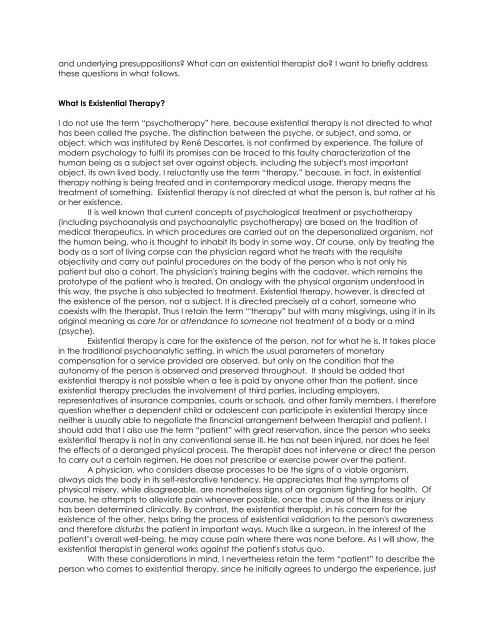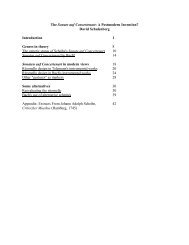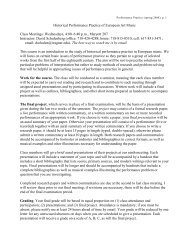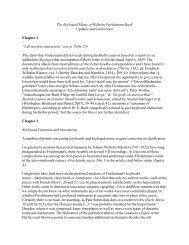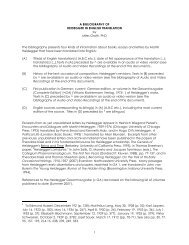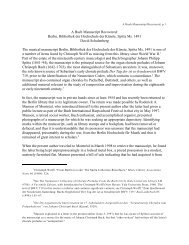SEVEN PAPERS ON EXISTENTIAL ANALYSIS ... - Wagner College
SEVEN PAPERS ON EXISTENTIAL ANALYSIS ... - Wagner College
SEVEN PAPERS ON EXISTENTIAL ANALYSIS ... - Wagner College
You also want an ePaper? Increase the reach of your titles
YUMPU automatically turns print PDFs into web optimized ePapers that Google loves.
and underlying presuppositions? What can an existential therapist do? I want to briefly address<br />
these questions in what follows.<br />
What Is Existential Therapy?<br />
I do not use the term “psychotherapy” here, because existential therapy is not directed to what<br />
has been called the psyche. The distinction between the psyche, or subject, and soma, or<br />
object, which was instituted by René Descartes, is not confirmed by experience. The failure of<br />
modern psychology to fulfil its promises can be traced to this faulty characterization of the<br />
human being as a subject set over against objects, including the subject's most important<br />
object, its own lived body. I reluctantly use the term “therapy,” because, in fact, in existential<br />
therapy nothing is being treated and in contemporary medical usage, therapy means the<br />
treatment of something. Existential therapy is not directed at what the person is, but rather at his<br />
or her existence.<br />
It is well known that current concepts of psychological treatment or psychotherapy<br />
(including psychoanalysis and psychoanalytic psychotherapy) are based on the tradition of<br />
medical therapeutics, in which procedures are carried out on the depersonalized organism, not<br />
the human being, who is thought to inhabit its body in some way. Of course, only by treating the<br />
body as a sort of living corpse can the physician regard what he treats with the requisite<br />
objectivity and carry out painful procedures on the body of the person who is not only his<br />
patient but also a cohort. The physician's training begins with the cadaver, which remains the<br />
prototype of the patient who is treated. On analogy with the physical organism understood in<br />
this way, the psyche is also subjected to treatment. Existential therapy, however, is directed at<br />
the existence of the person, not a subject. It is directed precisely at a cohort, someone who<br />
coexists with the therapist. Thus I retain the term “'therapy” but with many misgivings, using it in its<br />
original meaning as care for or attendance to someone not treatment of a body or a mind<br />
(psyche).<br />
Existential therapy is care for the existence of the person, not for what he is. It takes place<br />
in the traditional psychoanalytic setting, in which the usual parameters of monetary<br />
compensation for a service provided are observed, but only on the condition that the<br />
autonomy of the person is observed and preserved throughout. It should be added that<br />
existential therapy is not possible when a fee is paid by anyone other than the patient, since<br />
existential therapy precludes the involvement of third parties, including employers,<br />
representatives of insurance companies, courts or schools, and other family members. I therefore<br />
question whether a dependent child or adolescent can participate in existential therapy since<br />
neither is usually able to negotiate the financial arrangement between therapist and patient. I<br />
should add that I also use the term “patient” with great reservation, since the person who seeks<br />
existential therapy is not in any conventional sense ill. He has not been injured, nor does he feel<br />
the effects of a deranged physical process. The therapist does not intervene or direct the person<br />
to carry out a certain regimen. He does not prescribe or exercise power over the patient.<br />
A physician, who considers disease processes to be the signs of a viable organism,<br />
always aids the body in its self-restorative tendency. He appreciates that the symptoms of<br />
physical misery, while disagreeable, are nonetheless signs of an organism fighting for health. Of<br />
course, he attempts to alleviate pain whenever possible, once the cause of the illness or injury<br />
has been determined clinically. By contrast, the existential therapist, in his concern for the<br />
existence of the other, helps bring the process of existential validation to the person's awareness<br />
and therefore disturbs the patient in important ways. Much like a surgeon, in the interest of the<br />
patient’s overall well-being, he may cause pain where there was none before. As I will show, the<br />
existential therapist in general works against the patient's status quo.<br />
With these considerations in mind, I nevertheless retain the term “patient” to describe the<br />
person who comes to existential therapy, since he initially agrees to undergo the experience, just


